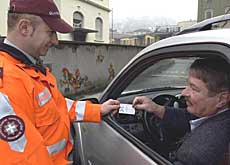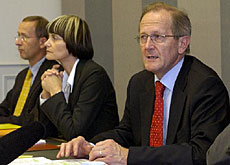Police crusade for closer ties with EU on crime

Police authorities have urged the public to back government plans to sign the European Union’s controversial Schengen/Dublin accord on cross-border crime and asylum.
The rightwing Swiss People’s Party has threatened to launch a nationwide referendum on the issue, if it is approved by parliament.
The justice and police directors of Switzerland’s cantons launched a campaign on Thursday to convince the Swiss electorate that closer cooperation with the EU would assist the fight against crime.
“If we commit ourselves to this accord, it is because we are totally convinced of the improvement in security that it will bring,” said Claudius Graf-Schelling, the head of justice and security of canton Thurgau.
Graf-Schelling was speaking at a meeting in Bern attended by 15 cantonal police chiefs.
The accords are contained in a second set of bilateral treaties, which Bern wrapped up with Brussels in May.
Parliament is set to debate them later this year after the government granted its approval earlier this month.
Bilateral treaties
Last month Switzerland’s 26 cantons came out in favour of the second series of bilateral treaties, but warned against any loss of their autonomy.
Three of the main political parties, the business community and the trade unions have also given the green light to the treaties.
Peter Grütter, the head of Zurich’s cantonal police, said the Schengen agreement would make it easier to carry out search operations, controls and investigations.
Swiss police would be able to tap into the Schengen Information System (SIS), which contains more than 11 million data entries on people and crime, he said.
Grütter added that this would cut out the time-consuming process of dealing with Europol and Interpol, and avoid legally questionable information exchanges between border police.
“Schengen would be a clean basis for cooperation,” he said, adding that more wanted criminals could be put behind bars if Schengen were accepted.
He cited the case of Germany, which – thanks to access to the SIS – was now arresting four times as many serious criminals as before.
Cantonal police directors fear that if the Schengen/ Dublin accord is thrown out, Switzerland will become a haven for asylum seekers who have been rejected by other European countries.
Ready to defend
A fortnight ago the economics minister, Joseph Deiss, and the foreign minister, Micheline Calmy-Rey, announced that the seven-member cabinet was ready to defend the bilateral accords in parliament.
The justice minister, Christoph Blocher, a member of the People’s Party, has made it no secret that he is against closer ties with Europe.
But he said he would campaign in favour of Schengen/Dublin, despite his party’s threat to force a nationwide vote on the issue.
Besides Schengen/Dublin, parliament will be debating seven other bilateral treaties concerning the taxation of savings, the fight against customs fraud, processed agricultural products, the environment, statistics, the EU’s media programme and pension schemes.
swissinfo with agencies
The treaties in the Bilateral II accords will be debated individually.
If a referendum on Schengen/Dublin were to succeed, the issue would have to be put to a nationwide vote.
The first set of bilateral accords with the EU went before voters as a package.
The Bilateral II accords between Switzerland and the European Union are due to be signed by the end of the month.
Parliament will debate them during its winter session.
Most political parties and business associations support them. The Swiss People’s Party is the only party in government opposed to Schengen/Dublin and has threatened to put the accord to a nationwide vote.

In compliance with the JTI standards
More: SWI swissinfo.ch certified by the Journalism Trust Initiative










You can find an overview of ongoing debates with our journalists here . Please join us!
If you want to start a conversation about a topic raised in this article or want to report factual errors, email us at english@swissinfo.ch.